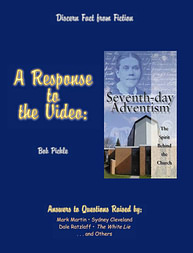| Pickle Publishing | "Miller's Meetings: Hysteria" | Research Papers |
Return to https://www.pickle-publishing.com/papers/jeremiah-films/response-to-video-8.htm.
A Response to the Video:
Seventh-day Adventism, the Spirit Behind the Church
by Bob Pickle
Answers to Questions Raised by:
Mark Martin, Sydney Cleveland
Dale Ratzlaff, The White Lie
. . . and Others
Discern Fact from Fiction
The Millerite Movement
< Prev T. of C. ... 1 2-3 4 5-6 7 8 9 10-11 12-13 14-15 16 ... Next >
| #8: "William Miller's meetings were marked by much emotionalism and a great deal of hysteria over Christ's imminent return."—David Snyder. |
#8: They were marked by emotionalism and hysteria. Not at all. The fact is that Miller and his associates suppressed this kind of thing. Perhaps Mr. Snyder is confusing the Millerite Movement of the 1830's and 1840's with what happened in Kentucky during the Great Revival of 1800 (Froom, vol. 4, pp. 38-46).
In a vast ecumenical movement like the Millerite Movement, many people of many beliefs and worship styles come together. There were some in the movement who would have felt comfortable in the more emotional services of modern Pentecostal and charismatic churches, but Miller and his associates consistently sought to repress such things and even called them fanaticism.
The eyewitness account of Pastor L. D. Fleming of Portland, Maine, has already been cited where he said, "There is nothing like extravagant excitement, but an almost universal solemnity on the minds of all the people." He also testified:
"The interest awakened by his lectures is of the most deliberate and dispassionate kind, and though it is the greatest revival I ever saw, yet there is the least passionate excitement. . . . It seems to me that this must be a little the nearest like apostolic revivals of anything modern times have witnessed." Miller, vol. 1, p. 17.
Unitarian minister A. P. Peabody of Portsmouth, New Hampshire, said pretty much the same (Bliss, p. 143).
Miller himself warned those looking for the Advent that Satan would attempt to "get us from the word of God" by "his wild-fire of fanaticism and speculation."—Ibid., p. 173. In a December 1844 letter he called vocal responses from the congregation during meetings fanaticism. The one example he gives is, "Bless God," showing to what lengths he went in his opposition to "emotionalism" and "hysteria." He then went on to write, "I have often obtained more evidence of inward piety from a kindling eye, a wet cheek, and a choked utterance, than from all the noise in Christendom."—Ibid., p. 282.
Regarding the seventh-month movement in particular, Miller testified:
There is something in this present waking up different from anything I have ever before seen. There is no great expression of joy: that is, as it were, suppressed for a future occasion, when all heaven and earth will rejoice together with joy unspeakable and full of glory. There is no shouting; that, too, is reserved for the shout from heaven. The singers are silent: they are waiting to join the angelic hosts, the choir from heaven.—Ibid., pp. 270, 271.
Joshua V. Himes, Miller's closest associate and ardent publicist, had this to say:
Not only Mr. Miller, but all who were in his confidence, took a decided position against all fanatical extravagances. They never gave them any quarter; while those who regarded them with favor soon arrayed themselves against Mr. Miller and his adherents. Their fanaticism increased; and though opposed by Mr. Miller and his friends, the religious and secular press very generally, but unjustly, connected his name with it;—he being no more responsible for it than Luther and Wesley were for similar manifestations in their day.—Ibid., p. 239. [p. 20]
So where exactly did this slander originate? Himes endeavors to show its origin by describing some incidents he is all too familiar with (pp. 229 ff.). In October 1842 John Starkweather, an Orthodox Congregationalist, became the assistant pastor at Himes's church, since Himes was often on the road with Miller. According to Himes,
[Starkweather] taught that conversion, however full and thorough, did not fit one for God's favor without a second work; and that this second work was usually indicated by some bodily sensation.—Ibid., p. 232.
Near the end of April 1843, things were such that Himes felt the matter had to be confronted. He addressed the congregation about the dangers of fanaticism, to which address Starkweather gave a vehement reply. So Himes gave another address, "exposing the nature of the exercises that had appeared among them, and their pernicious tendency."
This so shocked the sensibilities of those who regarded them as the "great power of God," that they cried out and stopped their ears. Some jumped upon their feet, and some ran out of the house. "You will drive out the Holy Ghost!" cried one. "You are throwing on cold water!" said another.
"Throwing on cold water!" said Mr. Himes; "I would throw on the Atlantic Ocean before I would be identified with such abominations as these, or suffer them in this place unrebuked."
Starkweather immediately announced that "the saints" would thenceforth meet at another place than the Chardonstreet Chapel; and, retiring, his followers withdrew with him.
From this time he was the leader of a party, held separate meetings, and, by extending his visits to other places, he gained a number of adherents. He was not countenanced by the friends of Mr. Miller; but the public identified him and his movement with Mr. Miller and his.
This was most unjust to Mr. Miller . . . .—Ibid., p. 233)
That it was. And it still is.
The documentation package gives no documentation for this charge whatsoever. Indeed, none can be found.
|
< Prev T. of C. ... 1 2-3 4 5-6 7 8 9 10-11 12-13 14-15 16 ... Next >
© 2005
Pickle Publishing
